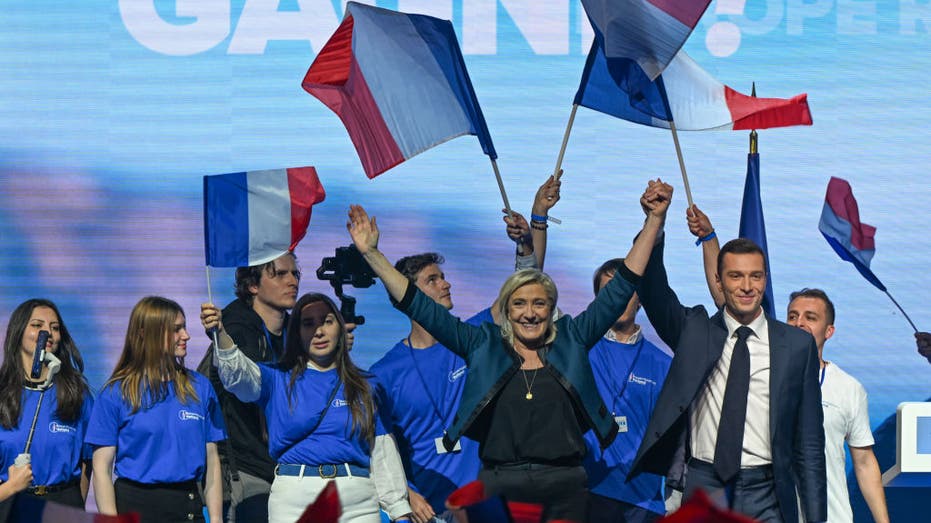French right in commanding position as 'fed up' voters prepare to send Macron message in elections
Voters in France go to the polls on Sunday in parliamentary elections. Macron called for elections after his party was soundly beaten by the right-wing National Rally in June's EU elections.

FRANCE - When the French go to the polls this Sunday, the result will likely reflect an unprecedented move to the right in what could lead to the most conservative parliament since the country was liberated in WWII, experts say.
The reasons come down to unhappiness with immigration, a weak economy, a cost-of-living crisis and dissatisfaction with the current centrist government, especially among younger voters.
"Right now, France is seeing its biggest shift to the right," Matthew Tyrmand, adviser to conservative political candidates and parties across Europe told Fox News Digital. "This is democracy at work—the people are mad as hell and not going to take it anymore."
Tyrmand continued, "The people of France are fed up with their cloistered Parisian leadership living high on the EU hog while their cities burn, youth unemployment remains high, crime continues to rise, racially motivated attacks and violence on native French persists."
It's the same factors that led the right-leaning National Rally to win 31.4% of the votes, the largest share of any French party in the European Union elections earlier this month. That National Rally, which was founded by Jean-Marie Le Pen in 1972, has reinvented itself over the past few years under the leadership of Le Pen’s daughter Marine, and now aided by the 28-year-old president of the party, Jordan Bardella.
Unfettered immigration, which totaled more than 320,000 last year plus undocumented migrants, has many French voters worried. "It’s more to do with instability and violence than about immigrants taking away jobs from the French," says Leo Barincou, a Paris-based senior economist for Oxford Economics. "You have crimes that made headlines that were immigrant-related; That’s what’s pushing the rejection of immigration." Some of those events included terrorist attacks, murders and assaults. Another factor swaying voters against more immigration is the cost imposed on taxpayers for social benefits," he told Fox News Digital.
The threat of violence may be one of the factors driving younger voters to demand deportation of some immigrants. There’s been enough passion around this topic to prompt some musicians to make a song distributed on social media sites that’s become popular among Gen-Z, people aged 11-26. Lyrics include "I won't leave, Yes, you will leave. And sooner than you think."
The economy under Emmanuel Macron’s centrist party hasn’t done well either. The cost-of-living crisis following the invasion of Ukraine sent inflation to 6.3% in February last year and subsequently fell to 2.1% recently. Youth unemployment remains at double-digit levels. Plus, the level of home building has trended lower over the last decade, making it more expensive for young people to rent. "If you have a cost-of-living crisis, whoever is in charge will bear the cost of that," says Konstantinos Venetis, director of global macro at TS Lombard in London. "Inevitably, when you get complaints from voters, then whoever is waiting to come into power will have an advantage."
However, Venetis notes that France’s economy is certainly no worse than other major European Union countries, such as Germany and Italy, and maybe even better than those. "This year is supposedly the year that the economy is going to bottom out," he says, meaning that economic growth looks set to improve. He says that’s likely to be powered by more government spending, perhaps even at an EU level.
Still, many younger voters and those who live in rural areas voted heavily for National Rally in the EU election earlier this month, and there would seem to be little reason to expect a different result this time. "There were very few places where the far right wasn’t first," Barincou said. The places that weren’t right-leaning included Paris, which fits with a long-standing narrative that people who work in professional jobs in large urban cities tend to take a progressive political stance, he says.
The likely passionate youth vote for National Rally may partly be driven by the youthful Bardella, who not only communicates his thoughts on TikTok but is also barely older than many in the Gen-Z cohort. "I am not too surprised he’s popular with younger voters," says Marc Chandler, chief market strategist at Bannockburn Global Forex in New York told Fox News Digital. "I remember young people being excited about former president Barack Obama being one of the youngest U.S. presidents."
A National Rally-led parliament, if it were to happen, would likely not lead to France leaving the EU or the single-currency Eurozone, Elias Haddad, a senior markets strategist at banking company Brown Brothers Harriman told Fox News Digital. "If the right wing come to power, the dynamics between France and EU will be a bit more complicated but not a threat to the monetary union," he says.
Meanwhile, Marine Le Pen looks like she’s planning for a win, suggesting that Bardella, as Prime Minister, should be involved with decisions on military defense. While nominally the French president is the head of the armed forces, the constitution states, "The prime minister is responsible for national defense."
The French parliamentary system requires up to two rounds of voting. If one party doesn’t get an overall majority in the first vote, then the top two parties will battle it out in a second poll. The latter would occur on July 7 if required. As of Friday, polls suggested that National Rally could get 37% of the vote.
The Associated Press contributed to this story.






















